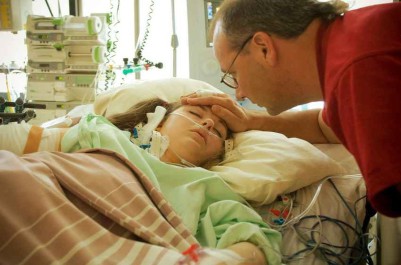How To Conduct A Hospital Visit
Some young ministers may not have been around death or serious illnesses. They may feel inadequate with words during times of illness or disease.
Hospital visits by a pastor are for those in the hospital, those who are preparing for a surgery, as well as family members. There is a special comfort when a person’s pastors walks in the door. A
visiting pastor brings calmness into an otherwise chaotic situation. Full article can be viewed and printed with
Word or PDF formats at the links located at the bottom of this page.
A visit should include a heart-felt concern about an upcoming operation, test, illness,and recovery: yet bring hope to those who need it. One should come into the room quietly, respecting the decency of the individual as well as respecting those who are there visiting. Asking questions to the patient or other family members is normal. Being light-hearted and encouraging can be appropriate but again, respect the gravity of the situation.
Sometimes it can be difficult to visit a patient in the hospital, but you can have a positive influence on them, whether they are your friend, family, church member, prospective church member, or relative of a church member.
Listed below are some simple visitor guidelines, including the Do’s and Don’t’s. These may be able to give you confidence you need for your visits.
- Do ask your patient's or other family member’s permission to visit before you arrive. Ask them to be candid with you. If they prefer you not visit, ask them if another day would be better, or if they would prefer you visit once they get home. Many patients love visitors, but some just don't feel up to it. Be mindful of the numbers of people visiting and respect their time and health. Do your patient the courtesy of asking permission.
- Do wash your hands and sanitize them before and after you touch the patient. If you wash your hands, then touch something else, like a telephone or TV remote or even the bed linens or your jacket, wash your hands and sanitize them again. Infections come from almost any source and the pathogens can survive on surfaces for days. You can't risk being responsible for making the patient even sicker than he/she already is.
- Do take balloons and flowers as long as you know your patient isn't allergic to them, and is in a room by themselves. Most ministers and churches will send flowers through a florist. If your patient shares a hospital room, the other person may have allergies. Be mindful of that. Most solid color balloons are latex, which is rubber, and some people are allergic to rubber. When in doubt, take Mylar balloons or don't take any at all.
- Do consider alternatives to balloons and flowers: a card, something a child has made for you give to the patient, a book to read, a crossword puzzle book, are good choices. The idea is not to spend much money; instead it's about making the patient feel cared for without creating problems that might trigger an allergic reaction.
- Do turn off your cell phone, or at least turn the ringer off. Different hospitals have different rules about where and when cell phones can be used. In some cases, they may interfere with patient-care devices, so your patient can be at risk if you don't follow the rules. In other cases, it is simply a consideration for those who are trying to sleep and heal and do not want to be annoyed by ring tones.
- Do stay for a short time. It is the fact that you have taken the time to visit, and not the length of time you stay that gives your patient the boost. Staying too long may tire them out. Better to visit more frequently, but for no morethan a half hour or so each time.
- Do leave the room if the doctor or provider arrives to examine or talk to the patient. The conversation or treatment they provide is private, and unless you are a proxy, parent, spouse or someone else who is an official advocate for the patient, that conversation is not your business. You can return once the provider leaves.
- Don't enter the hospital if you have any symptoms that could be contagious. Neither your patient nor other hospital workers can afford to catch whatever you have. If you have symptoms like a cough, runny nose, rash or even diarrhea, don't visit. Make a phone call or send a card instead.
- Don't take young children to visit unless it's absolutely necessary. Even then, check with the hospital before you take a child with you. Many hospitals have restrictions on when children may visit.
- Don't take food to your patient unless you know the patient can tolerate it. Many patients, especially those with certain diseases or even those who have recently had anesthesia for surgery, are put on special diets while in the hospital. Our goodies could cause big problems.
- Don't visit if your presence will cause stress or anxiety. If there is a problem in the relationship, wait until after the patient is well enough to go home before you stress them out by trying to mend that relationship.
- Don't expect the patient to entertain you. Your friend or church member is there to heal and get healthy again, not to talk or keep you occupied. It may be better for your patient to sleep or rest than to carry a conversation with you. If you ask them before you visit, gauge their tone of voice as well as the words they use. They may try to be polite, but may prefer solitude instead of a visit.
- Don't stay home, on the other hand, because you assume your friend or church member prefers you to not visit. You won't know until you ask. Many pastors have been roasted for them assuming or staying away. It is best to attempt making contact and personal visits than not. Most church members expect their pastor to be there and the fact that you are trying to help them by showing up or asking if it is okay to show up for a visit.
Copyright © 2022 Pastoral Care Inc. All Rights Reserved. All material is intended for individual use only. Any other use, such as distribution, promoting one's ministry or adding to websites, is prohibited unless written permission granted by Pastoral Care Inc.


